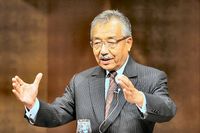


Toshio Matsuda, Commentator & Intl Economist
Straight from the Shoulder @No.455
Official Website : http://www.chokugen.com/e/
E-mail : masuda@sunraworld.com
FAX: 011 81 3 5965-0064
BackNumber is HERE!
gComplaint to Prime Minister Fukudah
The U.S. Economy on the Threshold of a Great Depression
In my last message in this column (No. 454), under the title of gComplaint to Ben Bernanke (U.S. Federal Reserve Board Chairman),h I commented on Bernankefs perception of the U.S. economy, the Fedfs sense of gmanifest destinyh (the mission of getting things done come hell or high water), the timing of implementing financial and fiscal policy and the risk of an impending gGreat Depressionh (in the mode of the depression of that name commencing in 1929). In my view, only Japan is currently capable of saving America from economic crisis. This means that Prime Minister Yasuo Fukuda shoulders a heavy burden of responsibility in that respect, and I am hoping that the ruling parties will become keenly aware of this situation.
Before proposing to Prime Minister Fukuda or others in charge of Japanfs policymaking work that they indeed act to furnish economic relief for the U.S., I would like Americafs leaders to take a hard look at their own economic crisis, which is rapidly reaching the point at which there can be no real relief.
The current global credit crunch and asset bubble collapse stemming from the subprime loan problem in the United States, are the result of the accumulated leveraging of financial products with compounded collateral, a phenomenon which spread around the world in a genuine pyramid format. Accordingly, even at the Fed, the cradle of the subprime debacle, there is no true understanding of the real scale and sphere of the asset contraction. To probe the true conditions of the asset bubble collapse, I recommend the approach taken by past Fed Chairman Paul Volcker. that is, letting the situation grun its own courseh before taking action; in effect looking to the market for answers. This is the strategy, in short, of allowing both land and stock prices to bottom out until an autonomous adjustment function kicks in.
A doctor who administers the final available remedy to a patient with a cold, despite lacking knowledge of whether that patientfs condition can improve or not, would be labeled a quack. In that sense, it would hardly be surprising if Fed Chairman Bernanke were to be called a quack in his own right. In the midst of the current accelerating inflation in the U.S., if the Fed continues to cut interest rates, the slide into a state of hyperinflation is an inevitable conclusion. Bernanke is mistaken in his anticipation that the economic slowdown will act on its own to apply brakes to inflation. With capital flowing from the equity (stock) market, for which the future is so uncertain, into the bond and commodities markets, commodity prices will rise and ultimately force up consumer prices. Contrary to the Fedfs hopes, the U.S. economy is currently descending into a state of stagflation (the combination of recession and hyperinflation).
Japan as Savior for America and the World
(My recent book Published by Tokuma Shoten)
The best chance for the U.S. economy is to use the weak dollar resulting from interest rate cuts to fuel overseas demand, thus promoting an economy driven by such foreign demand. The role of Japan as an ally is to promote expansion of its own domestic demand, thereby accommodating the U.S. economic strategy of relying on foreign demand. Action by Japan to promote economic policies aimed at expanding demand at home will also help engineer the transition to a state in which the balance sheet figures of the economy, impalpable to the Japanese people up to now, actually comes into tangible focus.
What Prime Minister Fukuda needs to do now for the United States and the world, and in the end for the Japanese people as well, is to come up with a package of bold fiscal stimulus and public investment. A sweeping shift in course must be made ? namely, from a passive strategy of restoring healthy finances through extreme steps to pare down the budget, to aggressive policies for putting the nationfs finances on sound footing. In more specific terms, this refers to daring and timely public outlays to increase annual revenues by expanding private and domestic demand.
If Japan were to declare to the world its intent to shift to aggressive public finance, I anticipate that global capital would stampede out of commodities markets and stream into Japanese equity (stock) markets. The rising stock and asset prices would render it easier for the Bank of Japan to take constructive action, resulting in the real estate market also reinvigorated.
At this critical juncture, therefore, I hope that Prime Minister Fukuda will turn a deaf ear to the advice of gold fashioned intellectuals,h and instead render a bold decision in the best interests of the U.S., the world and the Japanese people.
We request that persons wishing to quote from passages or articles in
gStraight from the Shoulderh inform the Toshio Masuda Secretariat of
Sunra World, Inc. of such desires in advance at: masuda@sunraworld.com
excerpts from the texts should direct their request in advance to the
Toshio Matsuda Office at Sunraworld, Ltd. (Tel: 81-(0)3-3955-2121).
BackNumber is HERE!